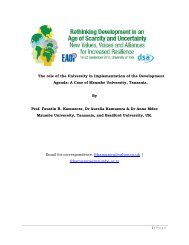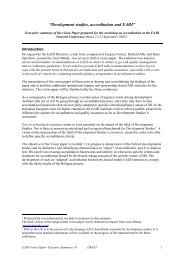Revenue Administration in Sub-Saharan Africa - International Tax ...
Revenue Administration in Sub-Saharan Africa - International Tax ...
Revenue Administration in Sub-Saharan Africa - International Tax ...
You also want an ePaper? Increase the reach of your titles
YUMPU automatically turns print PDFs into web optimized ePapers that Google loves.
Legal and adm<strong>in</strong>istrative powers of revenue bodiesChapter VIIKey f<strong>in</strong>d<strong>in</strong>gsGeneral powers of revenue bodies for debt collection• All the surveyed countries have sufficient (albeit rarely utilized) powers toenforce payment of tax, <strong>in</strong>clud<strong>in</strong>g the powers to:(1) engage taxpayers and agree on a reasonable payment schedule;(2) use tax clearance certificates as a means to bar debtors from undertak<strong>in</strong>gbus<strong>in</strong>ess activities with government agencies;(3) place a lien over debtors’ assets;(4) collect the debt from third parties that do bus<strong>in</strong>ess with the debtor; and(5) seize debtors’ assets.• About half of the revenue bodies surveyed have powers to publish the names ofdebtors, <strong>in</strong>itiate bankruptcy and/or asset liquidation procedures to recover taxarrears, and restrict default<strong>in</strong>g taxpayers from travel<strong>in</strong>g overseas (especiallynon-resident debtors).• Four revenue bodies have the powers to deny debtors access to certa<strong>in</strong>government services.Information Gather<strong>in</strong>g Powers of <strong>Revenue</strong> Bodies• The extent of powers available to revenue officials to enter and search bus<strong>in</strong>esspremises and taxpayers’ dwell<strong>in</strong>gs without a court warrant vary acrosscountries—only half of surveyed revenue bodies reported hav<strong>in</strong>g such powers.The other half have to apply for a search warrant from the courts or otherrelevant government departments.• In a few countries, revenue officials must be accompanied by a designated<strong>in</strong>dependent official (such as a police official) when conduct<strong>in</strong>g a search.• All revenue bodies surveyed have sufficient powers to obta<strong>in</strong> <strong>in</strong>formation fromthe taxpayer and third parties for the purpose of execut<strong>in</strong>g tax adm<strong>in</strong>istrationfunctions.• A number of revenue bodies have designed procedures to receive, process, anddissem<strong>in</strong>ate this <strong>in</strong>formation.• In addition, 9 countries reported they have powers to provide<strong>in</strong>centives/rewards to <strong>in</strong>formers to encourage provision of credible tax<strong>in</strong>formation.Interest and penalty regimes• Almost all revenue bodies impose either, or a comb<strong>in</strong>ation of <strong>in</strong>terest chargesand adm<strong>in</strong>istrative penalties on non-filers, late fil<strong>in</strong>g, late payment of taxes,and <strong>in</strong>correct declaration of tax liabilities across PIT, CIT and VAT, designed to<strong>in</strong>clude a comb<strong>in</strong>ation of both fixed amounts and ad valorem rates.• Interest and penalty regimes differ for the same offence across tax-type andspecifically for CIT and PIT on one hand and those for VAT on the other.80





